2 years ago, Bec & Chris didn’t even want to own a travel blog. Today they have an online business with millions of followers and travel all over the world. Here’s how they did it…
This was an excerpt from one of our live online bootcamps. Due to the bad internet connection, the video quality wasn’t our usual quality but you’ll still get a taste of what we do at Champions bootcamps…
Matt Raad: I’m here today with two very special guests, Chris and Bec. I wanted to talk about what you’re up to, and some of the things you’re doing based on our coaching conversations, especially with your travel site. You’re also making money off the LLA strategy (rank and rent), so we’ll talk about that too.
But to start with, everyone in our Champions community knows you both and that you’re travelling around in this glamorous four-wheel drive bus. So, let’s talk about how you got going in the travel niche first and what you’ve done together over the last couple of years.
Chris Dinham: I think to preface this, when I first started learning digital skills with Matt and Liz Raad, I said to myself, “I’m never going to create a travel blog. I’m never going into the travel industry because it is far too competitive, and everyone creates a travel blog.”
Then I ate my words, and now own a leading travel blog, Salt and Charcoal. We have the blog, Instagram, and now getting YouTube up and running.
Bec: Yes, with Matt’s coaching, we really want to focus on that. We know how beneficial it is.
Matt: Yes, that’s super important.
Bec: Very important.
Chris: We also have TikTok and everything like that. But, at the moment, our biggest thing is Instagram.
Bec: Well, we’re trying to move away from that and focus on other areas as well.
Chris: Yes.
Chris first started earning income online with his Digital Agency
They used this income to build their bus and fund their travels across Western Australia…
Matt: So, when you vowed that you would never have a travel blog or a website in the travel niche, can you tell us how this all started?
I want to point out to everyone reading this; you don’t all have to start out this way. Actually, I wouldn’t recommend it. But because Chris and Bec are young and hip, they started this travel blog only recently, thanks to Matt.
Where did you actually start? Wasn’t it due to you, Bec?
Bec: Yes, we basically hit the road on Chris’s income, which had become stable enough to support us both.
Chris: That was with the digital agency and LLA, which we’ll get into later.
You can read here how Chris transitioned from working full time on an oil rig to digital income in just 9 months.
Bec: We knew we could start travelling off that income.
Bec & Chris started documenting their travel adventures on Instagram
Bec: So, off we went, and I had my phone and GoPro. And I just thought, “I’m going to film everything we do and post it all online because it’ll be fun!”
And it was 100% just for fun, just sharing our passions. And we never expected anything, honestly. But the support was terrific. We had a lot of people messaging us saying, “Oh, I love what you’re doing. I want to see more of it.”
The more support we were getting, the more we grew. So, it started just like that.
Matt: And where did you primarily post?
Bec: It was Instagram.
Matt: Instagram. Oh my god. Okay.
Bec: Sorry, Matt!
Matt: Here’s where Matt is not always right. Okay? I was completely wrong because it’s turned into what it is today.
So, for all of us oldies, maybe we’ve all got to start looking at bloody Instagram! And we know within the Champions’ community, there’s a lot of students who have a creative side. You guys are really good at photography.
And like you said, Bec, you did it for fun, and you love it. And Chris, I’ve since found out you’re pretty good at photography too. I never knew that.
Bec: He was already good at it when we left.
Chris: Originally, I used to take a lot of photography but never really shared it that much through my travel, even before I met Bec. And then, when we started travelling, it was a good excuse to say, “Okay, let’s get back into it and spend a lot more money on photography gear.”
Bec: Yes, and write that off!
They started with zero followers on Instagram, but just kept posting…
Matt: I love your story Bec. So to recap, because this is super inspirational, I’m just running this through in my head.
Chris and Bec are making money off the digital agency and LLA strategies, which are rank and rent websites. It’s halfway between a portfolio and a digital agency strategy.
They realised they could earn income online and work remotely like Nathan and Alexa, Calem, and many other young Champions have been doing. And so, they trundle off around Australia, and Bec’s using her photography skills. They start recording their travels and sharing them on Instagram. The next thing you know, this thing starts to take off.
As everyone knows, we don’t teach social media strategies. But you just started, didn’t you, Bec? All you did was post something. And, when you think about it, that’s how you create a portfolio site.
Bec: Oh, 100%.
Matt: But then you guys figured out Instagram. You really dialled in the Instagram thing.
Why it’s important to include content on your website blog
Bec: The funny thing is, there are so many similarities between websites and social media. We’re doing a lot of education on Instagram. We share a lot of location tips and saveable content.
And what we’re noticing is different generations are into different ways of getting what they need. The millennial generation is quite big on Instagram. Whereas Gen Z is quite big on TikTok. So, it’s just different ways of getting quite similar information.
But then there’s Google, and everyone’s on Google. Everyone’s on the website. So, the website is the winner when having a whole portfolio across social media.
Chris: And most importantly, it drives a lot of traffic back to our site, which is what Matt’s been coaching us. We have two core assets, the website and the YouTube channel because they go hand-in-hand.
Chris thought it was too competitive to start a blog in the travel niche…
Matt: I remember when you first started talking to me and saying, “Oh Matt, we’re doing all the stuff you’re teaching Champions, but on Instagram and it’s gone really well.”
Straight away, I told you I had big concerns with this strategy, didn’t I? I asked, “Why aren’t you building up the Salt and Charcoal website? There’s nothing on here. What are you two doing? Post, post, post!”
Chris: That’s right, and I was listening in the background, groaning because I didn’t want a travel blog. I thought it was too competitive, but I was very wrong.
Matt: Yes.
Bec: When we first left, Chris literally said to me, “The one thing we will never do is a travel blog.” And I said, “Well, that’s a shame because we’ll be travelling a lot.” But in the back of my mind the whole time, I thought, “We’re going to have a travel blog.”
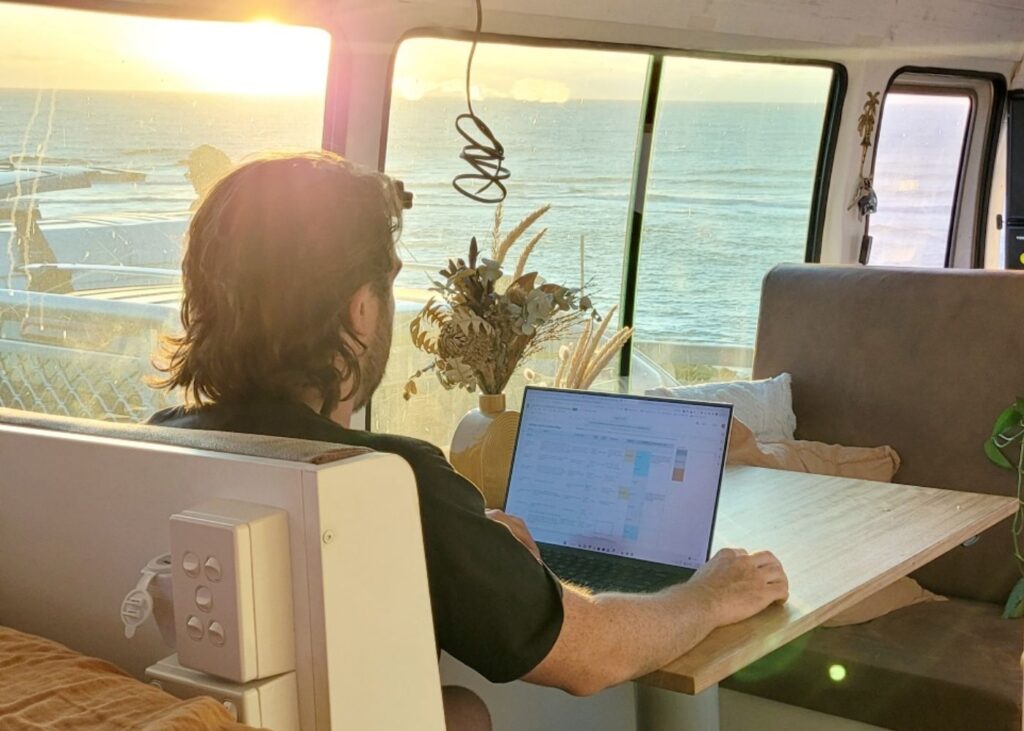
Why it pays to post regular content
Matt: And in terms of the success you’re experiencing on Instagram, when did you start noticing the numbers? Everyone here knows about SEO, but let’s see what social media can do because this is awesome.
When did it all start to take off for you?
Bec: When we hit a thousand followers, I thought, “Wow, we’re in big digits here.” That part happened quite fast.
Matt: Because back then, you essentially had no database. You knew no one, nothing.
Bec: No.
Matt: So, starting from zero.
Bec: It was just Mum and our families commenting and liking our posts.
Matt: And a couple of us Champions.
Posting content consistently grew Chris and Bec’s online business exponentially
Bec: Yes, that’s right. We realised we could get to 10,000. But there was a really weird time when we realised we have to be really consistent in our posting. The more consistent you are, the better the results.
So we pushed through that weird in-the-middle bit where we were thinking, “What is going on here?” And then we switched into business mode and realised, “Okay, just keep repeating the same thing that’s working.”
Matt: Awesome.
Bec: And that was when it grew exponentially.
Chris: Which is very similar to a website.
Bec: Yes, I always think that.
Chris: At the start, it gave us a little bit of a spike, and then there’s a long period of growth. For us, that growth took about a year.
Bec: Yes, consistently going up.
Chris and Bec tripled their online following within three months
Chris: Not necessarily growth, but that flatline or slow growth took about a year. And then, one day we woke up, and it went off quite quickly.
Bec: That happened quite recently.
Chris: Yes. It all happened in the last three months.
Bec: We tripled our following from just a few pieces of content we put out. It was incredible and really opened up new opportunities and doors overnight.
Matt: And you’ve had a hundred thousand plus views on certain videos, haven’t you?
Bec: That’s right.
They now have millions of views on certain posts…
Matt: Just to put it in perspective for us. You guys know what it’s like. When building portfolio and local sites, they might bring in a couple of hundred people a month when you first start out. But you guys are getting a hundred thousand views on certain posts, right?
Bec: We’re getting in the millions now. We’ve had 2+ million on a recent post, which is incredible.
Chris: That was on a paid partnership as well. We got them 2+ million views, and they were very happy!
Matt: All right!
How do Bec & Chris monetise their online business?
Matt: Now we’re getting to the interesting part, which is monetising all this. For our readers to understand, this is through Instagram. And I love how Bec just worded it – it’s the same process as what we do with any digital skills we learn in the Champions program. You stuck with it, consistently following Matt’s graph, and now it’s gone exponential.
Now, this is my opinion, because I’m old school! But I told Bec and Chris that in our experience, social media traffic doesn’t convert as well. You really need to get those bigger numbers. So, we need to get some of that traffic over to the good old-fashioned website and YouTube channel.
Chris: And an email list.
Matt: That’s right.
They got their first all-expenses paid trip to Abu Dhabi…
Matt: But prior to that, what sort of monetisation opportunities started coming your way? You guys have done quite well. So, can you share some of the cool stuff that’s started to happen for you?
Chris: Once we reached just under 10,000 followers, tourism companies and government tourism organisations started reaching out to us. They asked, “Would you like to come on this trip for free? You can take some photos and have a good time.” That was awesome!
And so, our first big break was overseas with a very large tourism body in Abu Dhabi. We had just under 20,000 followers and had only been at it for a year and a half.
They provided us with an all-expenses paid, five-star resort stay in Abu Dhabi for five nights. Obviously, we weren’t getting paid, but we got the whole trip for free which was incredible.
Bec: It was such an incredible experience.
Matt: What an experience! And you weren’t calling yourself travel bloggers at that point?
Chris: No, not yet.
Matt: But you were literally travelling around in a four-wheel drive bus around Western Australia at that point. And all of a sudden, you’re being flown to an Abu Dhabi five-star resort.
Chris: It was like the opposite of what we do! We live in a bus with no toilet or shower, and then suddenly, we were in a five-star resort in Abu Dhabi.
Matt: And that’s when I told you, “This is a real business here and could be way bigger than what you realise.”
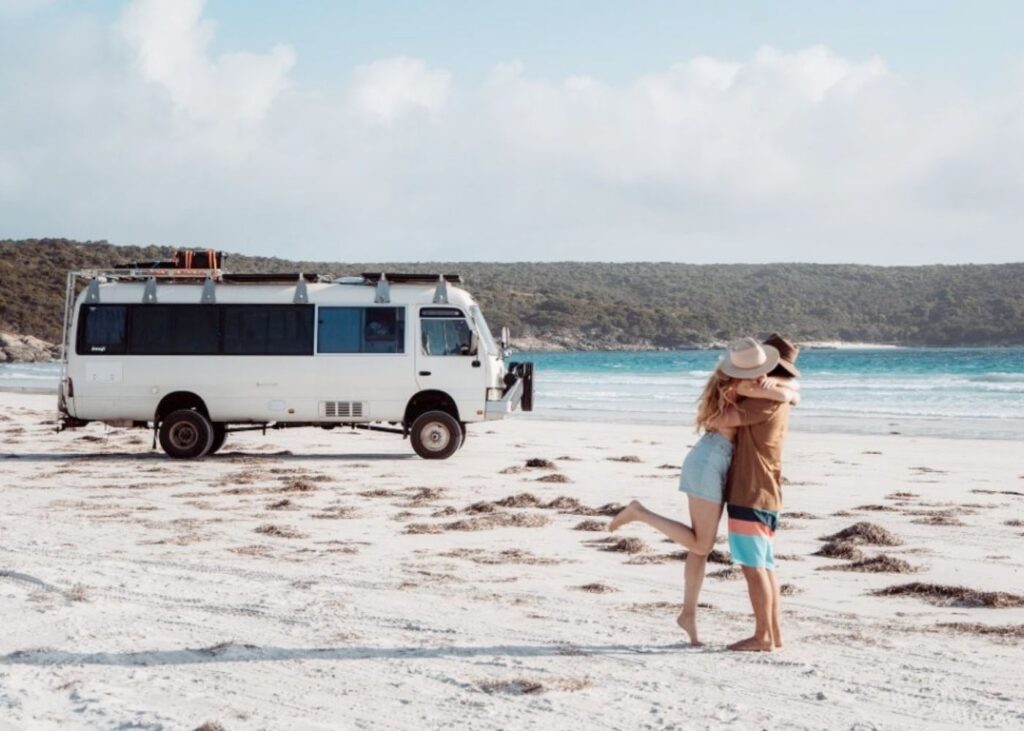
Matt Raad shows how you can add lucrative sponsorship deals to a growing travel blog
Why it’s essential to build your website asset outside of social media…
Matt: I want to reiterate to our readers; you don’t have to do this through social media. It’s just how Chris and Bec have done it.
But my first thought was that we’ve got to get serious here now because you’re starting to get corporates reaching out. You’ll get a lot of corporate sponsorship because we know other people in the travel niche who do well. And they get fully sponsored by Canon, Ricoh, or other camera guys.
So, I remember that’s when I said to you both, “You guys are young and hip Instagram influencers. And old buggers like me working at Canon (or big corporates with big money) will look at Instagram. But I can tell you the main place they’re going to check out for their corporate advertising dollars. It is your website, which is your number one asset.”
Corporates are going to do online due diligence on you if they’re going to sponsor you
Matt: I know social media is incredibly exciting, especially when you hear these sorts of numbers, hitting a million views. You got to make money somewhere, right?
But you’ve got to think business-wise. These corporates are always, always, always going to look at your LinkedIn profile, your YouTube channel, and your WordPress website. If they’re thinking of sponsoring (or buying) you, so you want to be thinking about that.
So, guess what I said to Chris and Bec?
“What corporate will buy you out for millions of dollars if they can’t find your website, or there’s nothing out there about you? It’s highly unlikely they’ll buy you out on your Instagram account. They’ll just pay you to be an influencer.” – Matt Raad, eBusiness Institute
You have to think long-term about all this. And full credit to them; they just went for it. Well, no, you didn’t at first. I had to keep pushing you along.
Bec: Yes, you did!
Matt: As you said, Chris, you never wanted to own a travel blog.
Bec: But it’s interesting you say that, Matt, because there were a few times where a partnership came through, and they said, “What actually got you over the line was us looking at your website.” So that was spot-on coaching from you.
Even Chris said, “With the digital skills we’ve learned from Matt and Liz, this is a huge advantage in any niche. But especially in the travel niche, because we’re up against people who don’t have those skills.”
Matt: That’s a really good point, Bec. You can present yourself to corporates.
Why beating your competition online in the travel niche is easier than you might think
…not just the Travel niche, but in ANY competitive niche…
Matt: And for our readers, this is a great opportunity. Think about it – most travel influencers are just like Chris and Bec. They’re just on Instagram or TikTok. But for all of you – you have the digital skills to be more professional than that. And to be honest, it’s as simple as setting up your website and sticking all your stuff that’s on Instagram onto your site.
By doing this, you can present yourself as a corporate, and they can see an asset there where they can pay lots of money to be on the homepage.
That’s exactly what our friend Alborz did with his multi-million dollar car website all those years ago. He didn’t use social media at all. Alborz would never be where he is today without setting up a proper full-on website. That’s where he got all the big car advertisers advertising for millions of dollars.
It’s the same in any niche and particularly in travel. And I really like what you just said, Bec. Your competitors are out there, but they don’t have these skills, and they’re not doing that.
Here’s how small bloggers have the edge over big corporates with their websites
Matt: Has it been pretty simple for you to do this, Chris?
Chris: Well, it has been simple. And this is what I didn’t realise right at the start about travel bodies. You have tourism websites, like Perth is Okay and westernaustralia.com. For them to write anything on their site, they have to pay an Australian writer. That might be something like $500 per blog post.
Secondly, they have to pay for images as well. They don’t take their own photos. It’s about $500 per image to purchase those rights, or more, as good photographers will charge thousands of dollars.
So all of a sudden, when these companies were trying to purchase our images, I realised why they were so slow. I’m looking at our blog, and we’re ranking for thousands of keywords. We’re now at a point where we post an article, and if we’ve targeted the keyword right, we’re in position three within 2-3 weeks.
And I’m thinking, “Why are these huge corporates with a lot of money not doing this?” First, they don’t really know the digital skills Matt and Liz Raad teach us. But also, they’re so slow and have to spend a lot of money on their articles. That’s what I didn’t realise at the start.
The competitive advantage is that we travel around, take some photographs, and quickly whip up an article.
Anyone could do that within their city too, and beat the big corporates to the punch because they can’t move fast.
Bec: We post better information, better images, everything.
Why big corporates are looking to buy small content websites
Matt: And gee, I’m going to bring you back in time here, Chris Dinham. Do you remember coming to live boot camps and hearing Alborz give virtually the same presentation to the Champions you just gave? Do you remember that?
Chris: Yes, I do.
Matt: All those years ago, when he was starting out, he said exactly the same thing, even in the car niche, which is hugely competitive. And I’ve got a feeling, Chris and Bec, you’ve helped all of us stumble upon an even easier niche than we initially thought because you’ve found the loophole. This is absolute gold.
All of you reading this have to realise this is what Alborz used to say about the car niche. The big corporates can’t catch any of us doing this, even in a super competitive industry like cars. And you would think the travel niche would be even more competitive, but it sounds easier based on what Chris and Bec are saying.
Chris: The travel niche is very easy, if you do good keyword research.
Bec: Should we be telling people this? 🙂
Chris: Yes, of course! There are so many keywords in this niche. Everyone here could do a travel blog, and we still wouldn’t stand on each other’s feet.
Buying smaller content sites saves larger corporates time and money
Chris: But I think because of that, you’ve got such an advantage. And that’s where the sales come in. The corporates know that building a large website is going to cost a million dollars. So, why don’t they buy a travel blog that’s already pre-built? And it’s cheaper.
Matt: It also comes with a sticky list and recurring revenues. That’s what the big corporates are looking for.
I’ll circle back to where Matt’s been wrong about social media. I do begrudgingly admit now that combining social media creates this massively attractive thing to corporates because they can see it’s sticky. And you guys have been smart and listened to me. You’re building an email list and a WordPress blog.
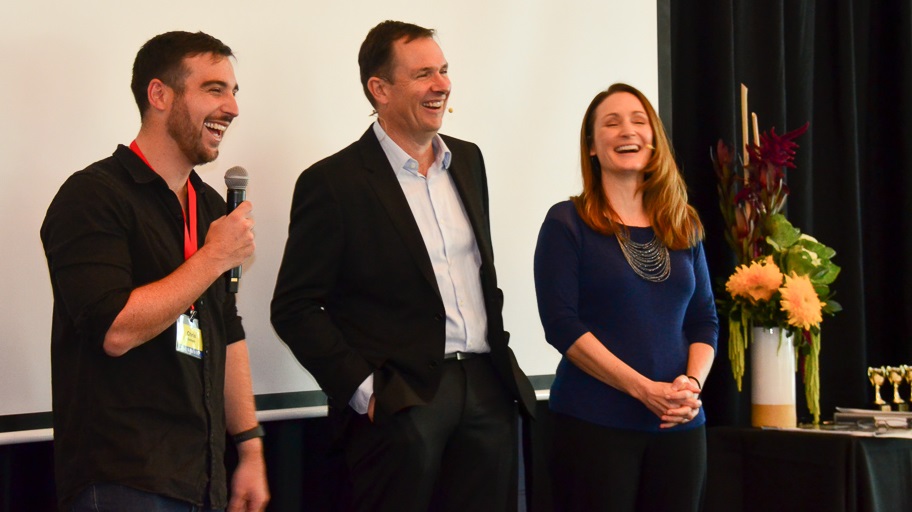
Why YouTube is so powerful for your WordPress blog
Matt: But also, in this day and age, I look at what corporates look at and see YouTube as an asset. Today, it goes hand-in-hand with the blog. And I said that to you both. You were really focused on Instagram, but the corporates are looking at YouTube.
Also, there are a lot of big advantages to building a serious YouTube channel from an SEO point of view. Because who rules the roost with SEO? It’s Google, not Instagram.
Bec: Absolutely.
Matt: Instagram and Google punch on. I personally think Google’s not a big fan of Instagram. But if you can get a big following on YouTube, I’ll put money on it; Google will promote you through SEO.
Bec: I think you’re right there.
Matt: You watch.
Creating video content for your online business has a HUGE added benefit…
Chris: Something that Bec is incredibly good at is creating videos. And there is a big benefit when creating videos within your community on Instagram, your blog and your YouTube channel.
Matt: That’s interesting.
Chris: If you look at it this way, we’re in a day and age where AI is starting to come in. And we’re seeing a lot of articles that are being created by AI. The advantage for people like us is the community, especially within the travel industry, because AI can never replicate something like that.
Looking at eBusiness Institute as an example, AI could never replicate the supportive community that you’ve created, Matt. And people are always going to be drawn towards that.
So, that’s where I think Instagram gives a real advantage. Not specifically an SEO advantage, but it offers businesses a way to talk directly to the customers and figure out what they want.
Bec: And it doesn’t matter what type of community that is. For us, it’s obviously travel and van life (or bus building). But for other people, it could be arts and crafts, pets, plants, etc. Whatever you’re into, there’ll be that community.
Matt: Absolutely, and this is super exciting. Just like Chris and Bec have just shared, the travel niche is possibly way easier than we ever thought because of what Alborz said to us all those years ago in the car niche. The big corporates can’t catch this.
Corporates don’t want to start from scratch and build a travel website. They have no interest in it and want people like you to go out there and do it. And if you’re successful, they might say something like, “Here’s $10 million. We’ll just buy it off you.” Or “Please stay with us for $1 million a year, ” etc., because they want a big following.
Using video to create REAL content for Google will help build a valuable online asset
Matt: But following on from that, the other big advantage of what Chris and Bec are doing (and what all of us are doing in the Champions program) is following the entire strategy of building your SEO footprint and YouTube channel. This is what beats AI and cannot be replicated.
This is a huge take-home lesson for our community. It’s what Matt and Liz Raad have been saying for quite some time now. Personally, I’m a fan of AI and what’s happening in the AI-written content space. It’s really fascinating, and I’ve been testing it out a lot. Liz and I have been theorising and talking to many people about this.
But at the end of the day, this is real content because it’s community-based. No one can fake what they’re doing. Chris and Bec are obviously living in a bus and filming themselves as they go around Australia. That’s what people want. They want to see your real experience, and it can’t be faked. In the future, this will become a hugely valuable web asset.
I want to reiterate that I don’t want anyone reading this just sticking it all on social media because that’s not an asset. Make sure you’re getting it onto an actual blog, and listen to Chris. Even if you vowed that you’d never set up a travel blog because it feels too competitive (even though that paradigm’s just been smashed!), have a go.
Chris: It was probably the fastest-ranking website we’ve ever had.
Matt: Oh wow.
Here’s why YouTube is so important for SEO…
Matt: And this is also why a YouTube channel is hugely important. I know a lot of younger readers don’t think that YouTube is as cool as Instagram. But from an SEO point of view, YouTube rocks because Google knows it’s real and has all the control.
You need to think through what’s practically happening here. Google has outright said they can’t access the firewall behind anything from Facebook. So, they’re not 100% sure whether the links or traffic are real.
Whereas Google owns YouTube, so they can check it out. So, my humble little common-sense guess is that Google puts a lot of weight on the E.E.A.T score (Expertise, Experience, Authoritativeness, and Trust) through SEO factors like YouTube etc. And even Google themselves are saying YouTube’s important, especially when it feeds in with your website.
So going forward, you guys are laughing because you’re building a massive asset for yourselves, and there are lots of opportunities there for you in the travel niche, as we’ve discussed. And there are many other monetisation opportunities for you as well, which you’re already discovering, like affiliates and ads.
Bec and Chris are now being paid to travel around the world
Matt: But it’s exciting times for you both because the double whammy of the SEO in that niche is these corporates and tourism bodies are now discovering you. It’s super cool. Every time I speak to you, you’re off somewhere else fully paid. And you’re actually being paid to do gigs now, right?
Chris: Yes. We’re at a point where instead of just going places for free, they pay us to go, which is awesome. I didn’t think our life would ever go that way. And now we have a talent manager.
Matt: Oh wow. You’re moving up in the world, guys.
Bec: It’s fantastic because she does all the outreach and networking for us. She’s got all the contacts, so we don’t need to sit there emailing and cold calling or all of that work. She does it all, puts out our portfolio, gets us the gigs, and takes a cut. It’s so smart.
Matt: Wow. See? It just gets easier!
Bec: It saves us so much time.
Matt: All you have to do is just keep up the traffic, keep posting and do what you love, which is travelling around and talking about your travel life in a van.
Bec: Absolutely. We’re just having a great time and sharing it.
Here’s how you can earn regular income from YouTube and content websites
Bec: But coming back to YouTube, you sparked something. And I did want to say this from a content creator’s point-of-view, and this is something Chris and I talk about a lot. When you post on Instagram, Facebook or TikTok, your video is relevant for a few days, maybe a couple of weeks. But the good thing about YouTube is that it’s an asset. It’s relevant for a long time.
And we have noticed Instagram doesn’t look after their creators as much as YouTube does. That’s a really important point.
Matt: That’s interesting.
Bec: YouTube will pay money for a lot of views. If you’re getting a lot of views, you can potentially earn thousands, if not millions, of dollars. We’re quite small, so it will take some time to reach that level. But you will be rewarded.
Whereas with Instagram, we can pick up brand deals and partnerships and things like this through it. But we’re not getting paid from Instagram, and it’s unlikely we will.
Chris: Also, remember what Matt teaches about earning recurring revenue online. It’s revenue where you’ve done all the hard work at the start, and then you can sit back and reap the benefits later.
For example, if you start getting subscribers on YouTube, you can keep that recurring revenue coming through. Your videos continuously increase in views over time because it’s evergreen content.
So, you just get paid for advertising, similar to having AdSense on your blogs. Whereas on Instagram, you have to do brand deals and constantly create new projects to earn money.
Bec: It’s a lot more work and more time needed.
Leverage your content on YouTube to create a valuable content asset
Matt: Yes, and I do want to clarify something here. When I say you own the asset on YouTube, I’m talking about the content asset. Whereas on Instagram and TikTok, it’s there for a couple of days, and then it’s gone. Has anyone been on Facebook and found a really cool post, then two days later, you can’t find it?
Whilst you don’t own YouTube, you own the content asset. You need to think of this content as your asset these days. And they feed your blog. They should go hand-in-hand.
Whenever you post on YouTube, you do the same thing on your blog and can point people to either. Some people prefer to watch it on YouTube, but others are happy to sit on your blog and watch it there.
Matt provides an exciting example for using YouTube to secure big corporate sponsorships for your website
Matt: Here’s a theoretical question. Say you come across the head buying agent for Canon, and you get along really well. You meet him for coffee in Exmouth (your favourite place, Chris and Bec!), and he’s there on holiday with his family. You’re chatting and he really likes you, so he says, “Look, we want to use you guys. What’s the best video you’ve ever done?”
Bec lights up and says, “Oh, I’ve got a video that’s had a million views. It’s of Chris and I swimming with the sharks at Exmouth!” So, he says, “Great, show it to me.”
But you’re searching through Instagram to find the video, and now he’s bored. It takes 10 minutes to hunt through versus, “Ah, let’s just go check it out on YouTube. I can find it easily there.”
Bec: True.
Matt: Even better, you flip open your laptop and easily show him your blog post. He sees it there, and you can say, “Oh, by the way, we can also see it on YouTube.” And he says, “Oh, could I put a sponsorship affiliate link under your YouTube channel?”
Imagine that? You can respond, “Not a problem. We can do it for you right now. I can put a banner ad in the right-hand corner and set that up for you tomorrow. It will cost you $50,000, not a problem.”
I’m just putting numbers in your head there. And you could say, “Look, with this awesome blog article, Canon could even be a sponsor of it. You could sponsor that specific article. We could say Canon sponsored this.”
Even though he may not be very technically minded, you can still easily show him, “Look, we could actually edit this article to show how we used Canon photography gear.” This becomes evergreen content forever for your new major sponsor, Canon.
He’s going to love that!
Why you can’t rely on posting just on social media for recurring income
Matt: And this is where it differs from socials because you can’t just go back and re-edit your Instagram posts.
Bec: No, because it’s not relevant anymore.
Chris: Nor can you update it.
Bec: That’s true.
Chris: Often, travel places change or get updated, and therefore you can update your blog with that change. But with Instagram, you can’t update it. You have to create new posts, and that’s a lot more work.
Bec: That’s why we’re taking your advice, Matt.
Matt: This is the beauty of it with corporates. You’ve got to realise the value of it now in this new world of AI-driven content.
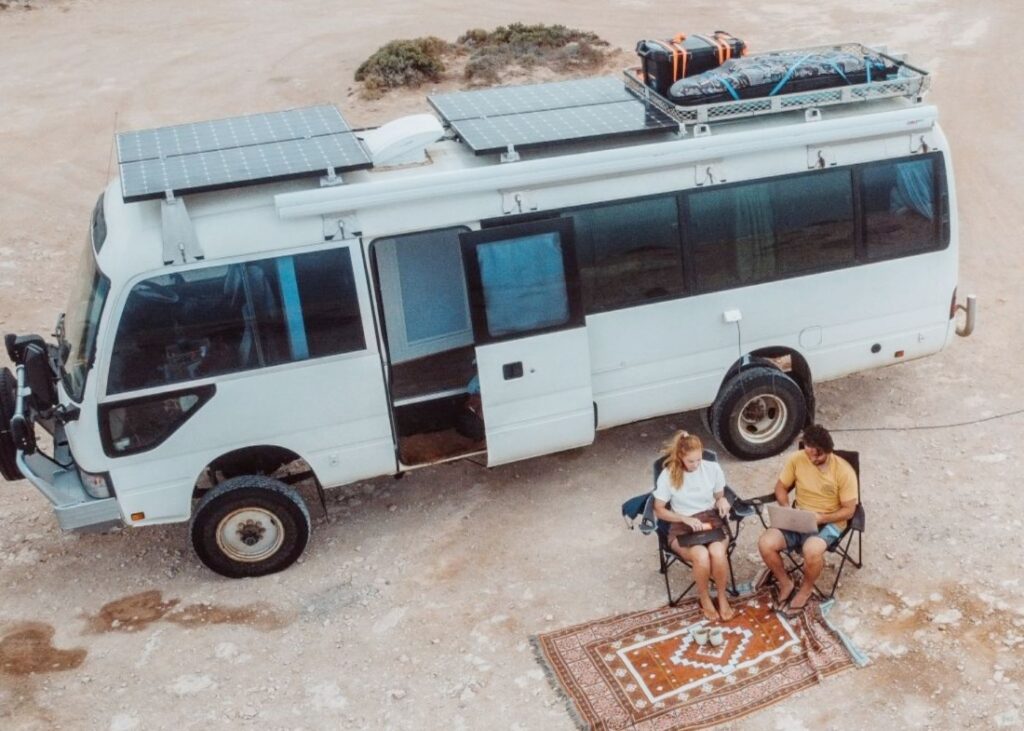
This is why good quality content is such a valuable asset today
Matt: Over the last ten years, content has become incredibly valuable. It’s like money in the bank. And if you’ve got a permanent place where your content works (particularly your website or YouTube channel), this becomes a valuable asset.
Out of all the content you create, there will always be pieces that turn into what we call “Pillar Articles”, a major winning article. And that becomes evergreen content for your website that you typically update and refresh once a year. It’s literally like owning real estate.
And that’s the beauty of posting all this great content to your travel blog because certain articles you guys are doing will become massive winners and hugely popular with your audience.
You’ll go, “Bingo, that’s the one we’re going to sell really expensive advertising space on.” You could charge something like $5,000 for an ad or whatever. And you can update the article every year and auction it out to the new highest bidder.
You can use quality articles on your blog to sell advertising space for big corporate sponsors…
Matt: We teach a similar method with our affiliate strategy. Actually, in the Champions program this week, we showed a directory site that included the 10 Best Wedding Venues in South Australia.
If we apply this to your travel blog, you could have something like “The Top 10 Best Places We Visited in X, Y, Z.” You can then go to each council and say, “Do you want to be at position number one? Well, it’s going to cost you $5,000. If you want to be number two, it will cost you $4,000.”
You’re getting direct sponsors to pay to be in the top number one position, and you say it’s a sponsored editorial. And we know for a fact this is what all these big directory websites are doing. You don’t even need to be an affiliate for them. It’s so much easier to say it’s $5,000 to be number one, get a mention in this article, or get a link.
And that strategy would provide a lot of security for you both while you’re travelling around. Not only are you having fun, but you’re turning this into a secure asset for your future. Yes, you need to do some extra work to edit a few videos and post them on your blog.
But think of this as money in the bank. It’s digital real estate.
Every little piece of content you create, particularly these days because it’s so real, will become hugely valuable (possibly way more than you realise) in the long term.
Bec: I 100% agree with you. We’ve had a massive shift (especially in myself) to really focus now and make something with this. This opportunity is so big, and we feel privileged and grateful for it. And it’s time now to get stuck into it.
How buying old, neglected sites in your niche can leverage your online success
See how our students are using this strategy to earn incredible income!
Matt: There’s a really big opportunity in the travel niche for real content. And something Bec and Chris have talked to me about is buying up old, neglected travel sites. That’s exactly what we teach in the Champions program. We recently had a Champion student, Sandra, purchase an awesome travel website. So, we might do an interview with her about that later.
But if you really want to crack it in this niche, an intelligent move is to buy up neglected (or forgotten) old travel blogs because they have real content on them.
Annette now earns $4,000 a month from a neglected website she bought for $5,000
Matt: Another student, Annette, followed the same strategy in our Digital Investors program. She won the Best Website Buy award at our Digital Investors Summit. She bought a simple little website about travelling around Australia that was 14 years old. It had hundreds and hundreds of legitimate articles written by retirees (grey nomads). So, it was all real content.
The site owners put it in their grey nomad Facebook group, “Hey, does anyone want to buy our site? We’re stopping our van life now, so make us an offer. We don’t know what this website’s worth.”
Annette saw the opportunity and said, “I’ll give you $5,000 for it.” The lady accepted the offer, and the site’s already making $4,000 a month. And Annette is now travelling around Australia, living off that website. It’s pretty cool.
If you think about it, given it’s making $4,000 a month, that site’s probably worth over $100,000 now. Any day of the week, she could sell it through leading website broker Joe Burrill or on Flippa etc., and she would easily get $100,000 for that website.
I remember the day she bought that site, Chris; you and I both offered her $10,000 for it straight away! But she combined it with her other travel blog because she was already active in that niche. I remember Annette’s story really inspired you, and you are now fully in this niche. This is one of your big income-generating sites.
Bec and Chris are now using this strategy to make even more money online
Matt: So, you guys are also looking around to buy up neglected sites. We call them “diamonds in the rough”.
Chris: Yes, definitely. There are lots of passion travel websites out there that people have maybe just stopped a year or two ago. They’ve gone around Australia and done a lot of blogging but then realised that maybe blogging’s not for them.
Matt: Because they don’t know how to make money out of it and don’t come at it with a business strategy like you guys.
Bec: Yes.
Matt: And they’ve typically done it during COVID, but now they’re back at work. They’re back earning a full-time income and think, “Oh, it takes work to post on this blog.”
Chris: That’s right.
Matt: So, they’re ready to sell them off. But imagine if you guys could get a couple of really good travel sites.
Bec: We’d triple the size!
Matt: Yes, you would 🙂
And you guys would know straight away how to monetise it with the same existing people (or corporates) who are paying you affiliate commissions.
Bec: Exactly.
Matt: Just like Annette, who took her website to $4,000 a month, you have the skillset to triple the income easily.
It would be a very smart move for you two to have a couple of little passive websites on the side.
Bec: We have been talking about it for a while.
Chris: Definitely. If anyone knows any travel blogs for sale, send them our way!
A big opportunity right now for purchasing existing sites for their content
Chris: But that would be the next stage because you’re always bootstrapping these websites unless you get investments. You’re always a bit restricted on how much content creation you can do on a month-to-month basis. Obviously, the more money you make, the more content you can create.
Buying a website really shortcuts all that. In some cases, you can buy the website for less than the content would’ve cost because they have yet to monetise it.
Example of a corporate raising money to acquire small websites for their content…
Matt: And that’s very typical. Here’s an interesting example of that. I interviewed Benjamin from TreasureHunter about how to increase your website revenue. They raised €10 million to do exactly what you said, and one of the niches they target is the travel niche. That’s their biggest success story.
I was interested in talking to Benjamin because he started by creating a local SEO agency like everyone else in the Champions program. He quit university, started an SEO agency, and now he buys up websites for their content.
All they buy are websites in passion niches like soccer (or other kinds of sport) or, ideally, travel. They love to travel, and their bigger success story is buying a hiking website.
Chris: I’ll have to check out that website.
…they raised €10 million to purchase old, neglected sites with valuable content…
Matt: I’ll summarise what they did. These guys are all SEO legends. They’ve been doing it for the last decade and raised €10 million. That’s a serious amount of money to go out buying websites. But what’s interesting is they’re not necessarily keeping the domains or anything. They’re buying them sometimes just for the content.
Because, as Chris said, they’re finding with those old, neglected sites where people are just tired of their blogs, but there’s valuable content on there. These pseudo-big corporates are buying them up just for the content alone and sticking them on their own websites (or doing redirects). It is really interesting, and it’s working really well for them.
Chris: Think of that combined with the strategy of visual storytelling. You buy an old blog article that’s more wordy. Then all of a sudden, you pour it over onto your website and then add the visual aspect to it.
That would be super quick, right? You just change the text, do a quick edit, add some images, and maybe include a small video or something. Then all of a sudden, you’ve been boosted up in the rankings.
…and they’re constantly looking for more content sites with valuable content to buy…
Matt: Well, it is a big strategy out there now. I’m speaking to these bigger corporate buyers behind the scenes who are looking to buy. They come to us and say, “Do you have any students selling good passion sites?”
That’s how TreasureHunter found us. And there are some other people that I’ve spoken to who are doing the same thing. They’re buying up long-established sites just for the content because it’s real, particularly in those passion niches.
The pet niche is also quite popular in this community. And we’re hearing from some of the top brokers that these are really popular in the marketplace now. Food blogs are also very popular. I never thought they would be worth as much as they are now. But it’s for the same reason – these blogs have real content.
And they just buy these sites up because it’s got the following and everything. They either absorb it into their own existing big website or do redirects on it. In some ways, it’s easier for them to just pay a couple of million bucks for your little passion blog and get the content.
So, I’m not saying to sell out to them just yet. You should build up the assets you’ve got.
Chris: Maybe we’ll contact them and flag who we are. You know what I mean? It’s like, “Watch this space and see what we’re doing”.
Matt: That’s why you do interviews with me, see? Because they’re all starting to see these interviews now. You want to be on our Digital Investors podcast because buyers are hunting around. It’s an interest, and that’s how TreasureHunter found us. You’re probably already on their radar.
Make money online by creating valuable, authentic content for your community
Bec: Well, I’m seeing the trend here, Matt. When you’ve got passion, you do a thorough, researched, enthusiastic job of it. So, it’s real, like you said. With that comes community because people think, “This is authentic, and it’s real content. That’s what I’m looking for.”
And you’ll make money for all the right reasons because you’re so passionate about it. You’re enthusiastic and put in the work. It makes so much sense that you should focus on what you’re passionate about.
Matt: I love it. Just like Tony Robbins says:
“The ideal in life is if you can make money out of what you love doing.” – Tony Robbins
Bec: That’s why we’re so happy! We enjoy it.
Chris: There you go, Matt. Cut that up and put that in your Instagram reel 🙂
Click here to read more about how Chris is able to earn more and work less with semi-passive websites
Matt: Well, a big thank you to you both. You’ve made a lot of us here in our community very happy by sharing your story so openly and seeing what you’re doing while travelling around. Everyone loves hearing the updates from you guys and seeing you. And it’s been a real buzz for Liz and me to see you grow so much.
It’s also great to see your van looking so immaculate and trendy today. It looks like it’s out of an Instagram reel.
Bec: Maybe it’s for Instagram. 🙂 No, it not…
Matt: You should start an Instagram thing on home decorating your van. So, there you go.
Bec: I’m happy with that!
Matt: Well, I’m sure that’s a keyword around that topic.
But I do want to say a big thank you for sharing your story today. It’s been awesome, and our community has appreciated hearing it.
Chris: Thank you, guys.
Bec: We look forward to hearing your students’ stories. We’ll be right behind you.
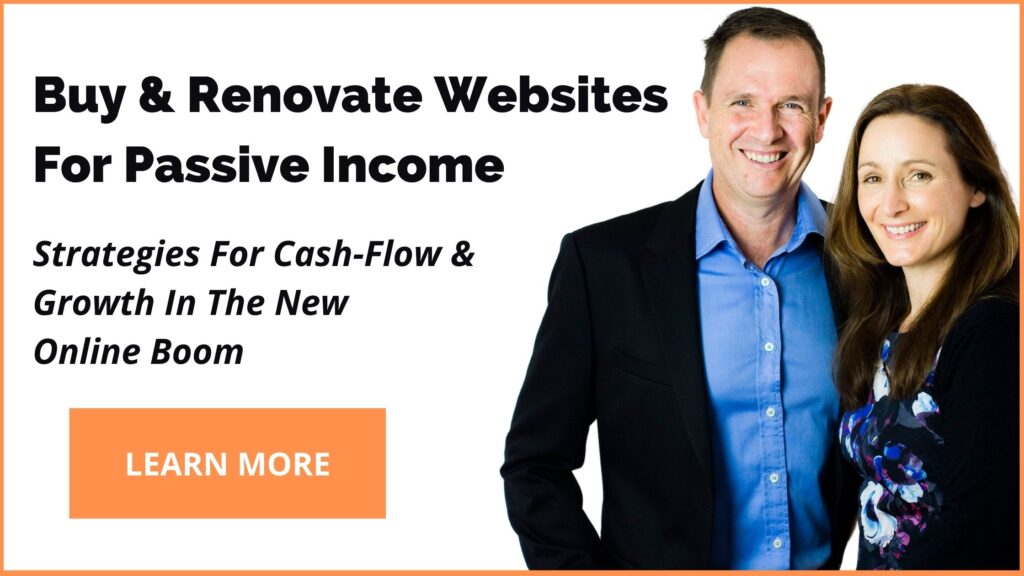

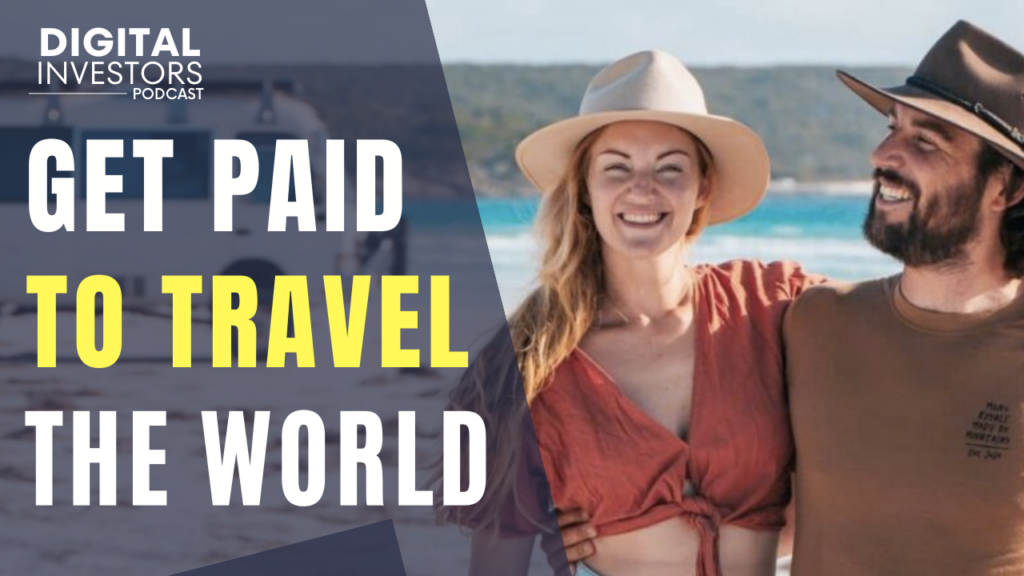
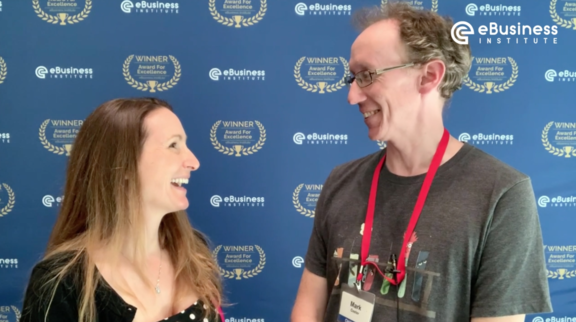
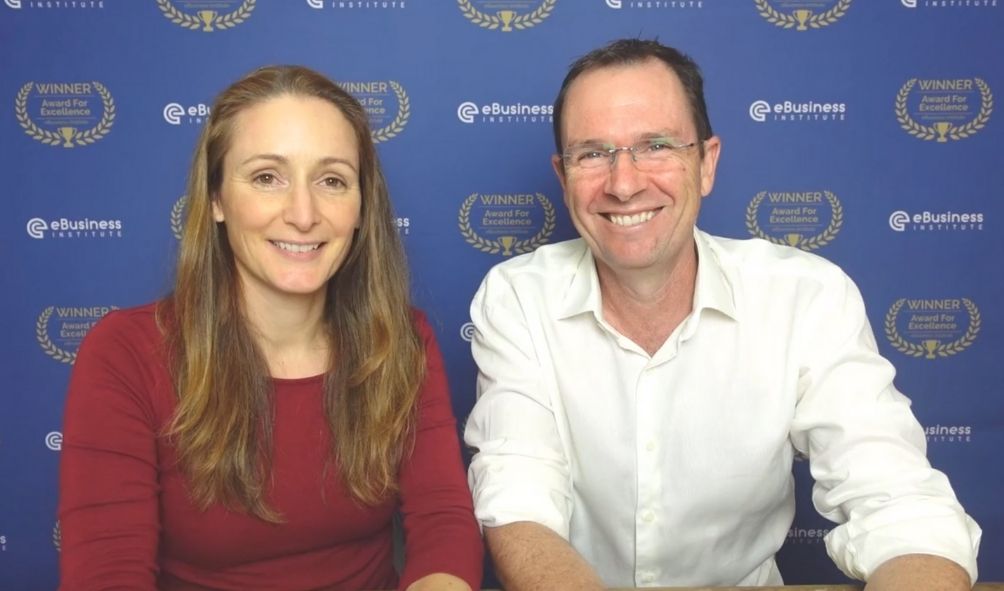
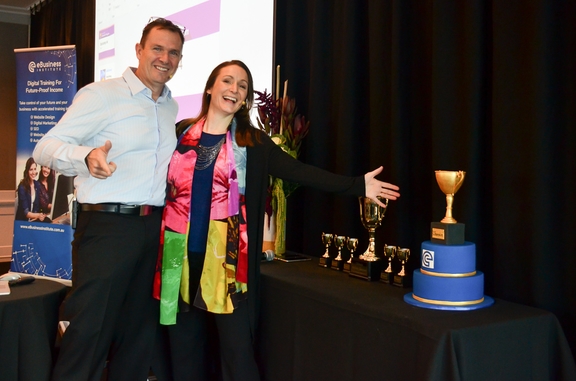
Hi,
This couple’s journey from travel enthusiasts to professional travel bloggers is truly inspiring. Their story shows that with passion and dedication, you can turn your wanderlust into a successful career. Thank you!
I read your blog and love your writing